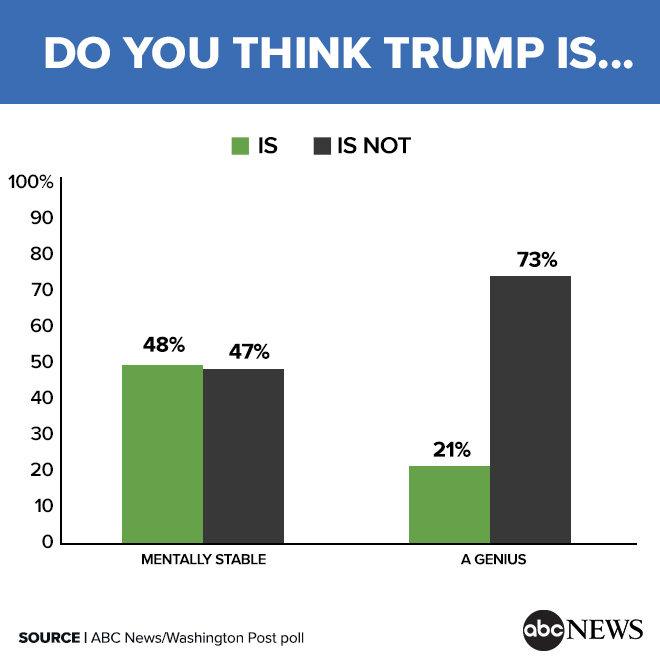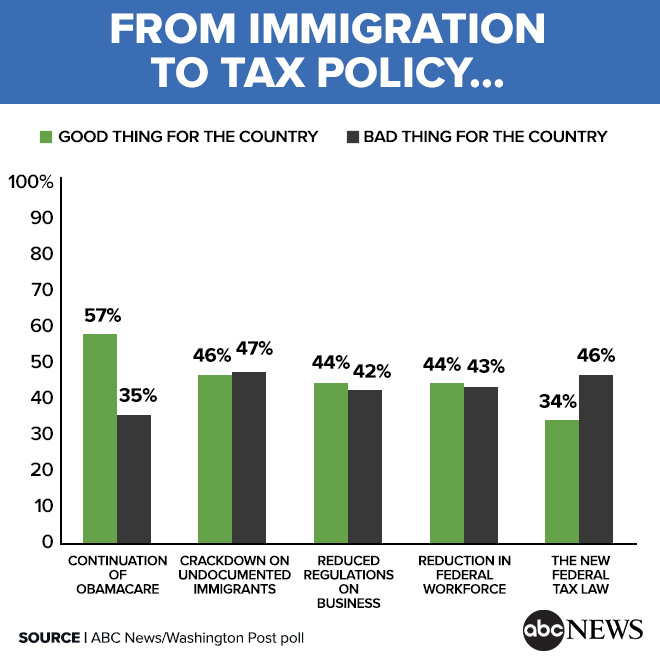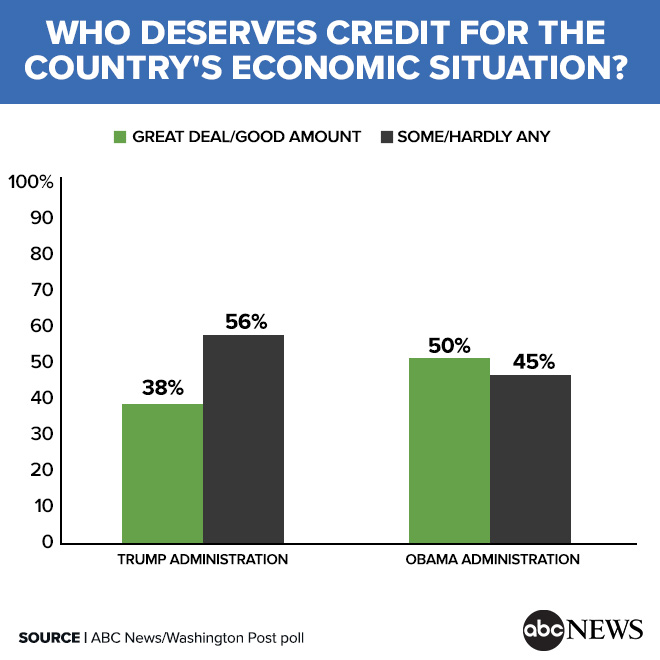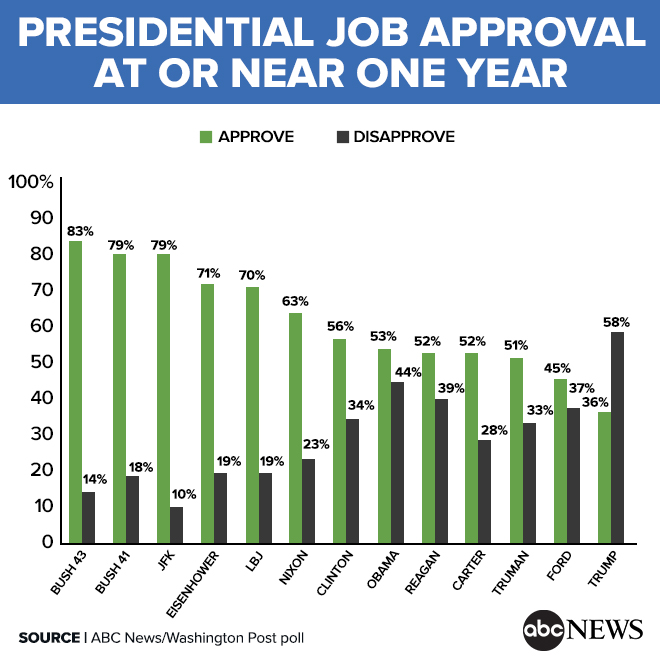Amid record low one-year approval rating, half of Americans question Trump's mental stability: POLL
A new ABC News/Washington Post poll.
— -- A year in the presidential spotlight hasn’t been kind to President Donald Trump: His approval rating is the lowest in modern polling for a president at this point, with deep deficits on policy and personal matters alike. Strikingly, the public divides evenly on whether or not he’s mentally stable.
That question aside, a lopsided majority, 73 percent of those polled, rejects Trump’s self-assessed genius. Seventy percent say he fails to acquit himself in a way that’s fitting and proper for a president. Two-thirds say he’s harming his presidency with his use of Twitter. And 52 percent see him as biased against blacks -- soaring to 79 percent of blacks themselves.

See PDF for full results, charts and tables.
Just 36 percent of Americans approve of Trump’s job performance, while 58 percent disapprove, essentially unchanged since midsummer. Next lowest at one year was Gerald Ford’s 45 percent in 1975; average pre-Trump approval -- since Harry Truman’s presidency -- is 63 percent.
Women are especially critical of Trump in this poll, produced for ABC News by Langer Research Associates: A mere 29 percent approve of his work, vs. 44 percent of men. And a remarkable 55 percent of women doubt Trump’s mental stability.
Trump’s signature achievement, the new tax law, is unpopular; 60 percent say it favors the wealthy (even most well-off Americans say so), and the public by a 12-point margin, 46 to 34 percent, says it’s a bad thing for the country. At the same time, a majority celebrates his most prominent failure, on Obamacare; 57 percent say the program’s continuation is a good thing.

A vast 87 percent support the DACA immigration program that Trump ended and whose fate in Congress is uncertain -- including two-thirds of strong conservatives, three-quarters of evangelical white Protestants and as many Republicans, core Trump groups. And 63 percent overall oppose a U.S.-Mexico border wall, essentially unchanged since before the 2016 election.
As reported Friday, Trump -- and his party leaders -- also are at greater risk in the government shutdown, with Americans 20 points more likely to say they’d blame Trump and the Republicans in Congress than the Democrats in Congress.
More issues
In a controversy that continues to cloud his presidency, half of Americans think members of Trump’s 2016 presidential campaign colluded with Russia to try to influence the election. About as many, 49 percent, think Trump himself obstructed justice in the Russia investigation.
That said, far fewer, 26 percent, think there’s been “solid evidence” of obstruction; the rest call it their suspicion only. And approval of special counsel Robert Mueller’s handling of the investigation has ebbed, from 58 to 50 percent in 11 weeks.
Trump’s ratings might be yet worse were it not for sharply improved economic sentiment. Fifty-eight percent say the economy is in good (or even excellent) shape, the most in 17 years. But just 38 percent say the Trump administration deserves credit; many more, 50 percent, credit the Obama administration. It’s axiomatic that a successful economy doesn’t guarantee presidential popularity, it merely makes it possible -- and Trump’s other challenges tie his shoelaces.

There’s criticism for the Democrats, as well, in their response to Trump’s unpopularity, but it’s eased to some extent. In November, 61 percent of Americans said the Democratic Party’s leaders were criticizing Trump without presenting alternatives; that’s down to 53 percent. However, just 31 percent say the Democrats are offering alternatives, essentially unchanged from 28 percent last fall. Instead, more now are simply unsure.
It’s true, too, that some Trump initiatives, while not popular, are not broadly opposed. Three divide the country about evenly: the federal crackdown on undocumented immigrants (46 percent say it’s a good thing for the country, 47 percent a bad thing); reduced business regulations (44-42 percent); and a reduction in the federal workforce (44-43 percent).
Among other results, 60 percent say Trump’s accomplished not much or nothing in his first year; Bill Clinton did as badly on that score, but still ended 1993 with an approval rating that’s 22 points higher than Trump’s today. Most, in another result, say Trump’s policies haven’t affected their own families, but more say they’ve been hurt (26 percent) than helped (20 percent).
Approval
Trump’s gone from 11 points underwater in job approval last spring to 22 points today, a shift that occurred by July and has stabilized since. That’s a vast swing from his 12 predecessors, who averaged 29 points to the positive after a year in the White House.
Four previous presidents -- Barack Obama, Jimmy Carter, Ronald Reagan and Truman – were at 51 to 53 percent approval after one year; Bill Clinton saw 56 percent and the rest ranged from 63 percent (Richard Nixon) to 83 percent (George W. Bush, after 9/11). Ratings at one year don’t predict a career trajectory. That said, a score in the 30s, this early in a presidency, is uncharted territory.
Indeed just six of the past 12 presidents ever went as low or lower in approval as Trump is now -- Truman, Lyndon B. Johnson, Nixon, Carter and both Bushes -- and all but Truman, much later in their presidencies.

Trump’s “strong” disapprovers, moreover, outnumber his strong approvers by a 2-1 margin. Obama got there as well, but it took him more than two-and-a-half years in office, and a deeply struggling economy.
Compared with the first ABC News/Washington Post poll of his presidency, in April, Trump is less popular generally across the board, but especially among college graduates (-11 points, to 31 percent approval), residents of the Northeast and West regions (-9 and -8 points, respectively) and whites -8 points, vs. no change among nonwhites, who started so low).
Partisan gaps
There are impressive differences among groups above and beyond the wide gender gap in Trump’s approval. He’s at new lows, 6 and 7 percent approval, respectively, among Democrats and liberals, compared with 80 percent of strong conservatives, 78 percent of Republicans and 68 percent of evangelical white Protestants. (He slips to 59 percent approval among “somewhat” conservatives.)
Such gaps have become a fixture of the sharply divided political firmament. Obama, for example, saw a low of 7 percent approval for Republicans, at the same time (March 2015) that he was at 79 percent among Democrats.
Partisan predispositions influence more than job approval. Consider:
-- Seventy-nine percent of Democrats think Trump obstructed the Russia investigation, and 51 percent of independents agree – diving to just 13 percent of Republicans.
-- Seventy-five percent of Democrats think Trump is not mentally stable. Forty-six percent of independents share that view. Just 14 percent of Republicans agree. (Party and ideology aside, Trump is most likely to be seen as stable by white evangelicals, 79 percent, and non-college-educated white men, 69 percent; and most likely to be seen as not stable by nonwhites, including two-thirds of blacks and Hispanics alike.)
-- Fifty percent of Republicans say Trump’s a genius. That plummets in other groups -- 17 percent of independents, 6 percent of Democrats. There’s also a notable division within conservative ranks on the question. Among people who are strongly conservative, 52 percent call Trump a genius, while among “somewhat” conservatives, this drops to just 29 percent.
Groups/issues
There are notable differences among groups on substantive issues as well. Fifty-eight percent of whites call the federal crackdown on undocumented immigrants a good thing for the country; just 26 percent of nonwhites -- including 18 percent of Hispanics -- agree. Or, looking at two key voting groups in 2016, 74 percent of non-college-educated white men say it’s a good thing, compared with 39 percent of college-educated white women.
Then there’s the tax bill. Among Americans on the lower half of the income scale, 26 percent call it a good thing for the country, compared with 41 percent of those with middle incomes or more. Even in those middle and higher ranges, though, there’s only a division on whether the bill is a good thing or bad thing -- 41-43 percent in the $50,000 to $100,000 bracket, and about the same, 40-43 percent, in the $100,000-plus range (about two in 10 adults).
One last finding cuts to a telling example of general agreement, rather than disagreement, and again not to Trump’s advantage. Among lower-income Americans, 64 percent say the tax bill favors the wealthy. And among the comparatively wealthy themselves, those with $100,000-plus incomes, 56 percent say the same thing.
Methodology
This ABC News/Washington Post poll was conducted by landline and cellular telephone Jan. 15-18, 2018, in English and Spanish, among a random national sample of 1,005 adults. Results have a margin of sampling error of 3.5 points, including the design effect. Partisan divisions are 31-23-40 percent, Democrats-Republicans-independents.
The survey was produced for ABC News by Langer Research Associates of New York, N.Y., with sampling, data collection and tabulation by Abt Associates of Cambridge, Massachusetts. See details on the survey’s methodology here.